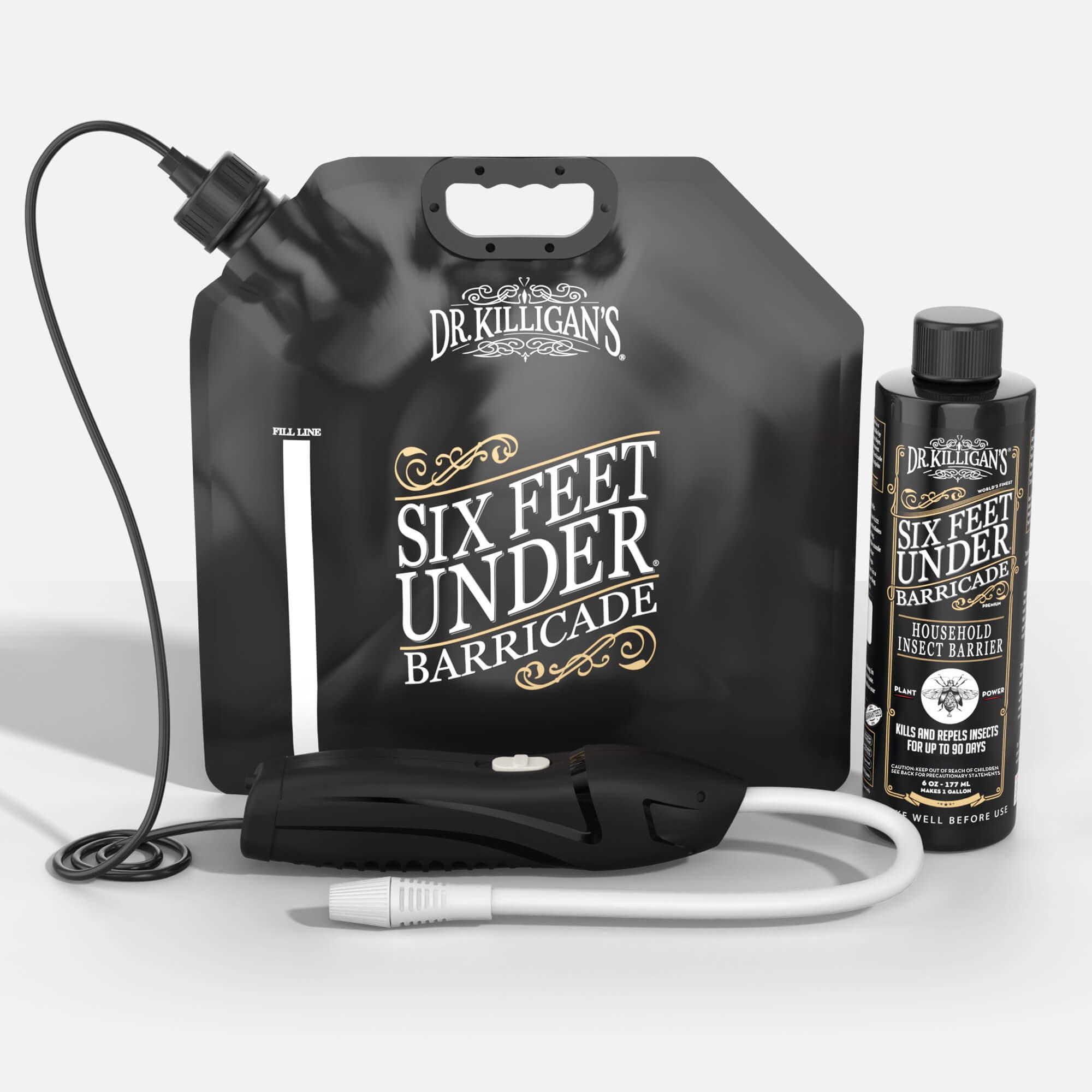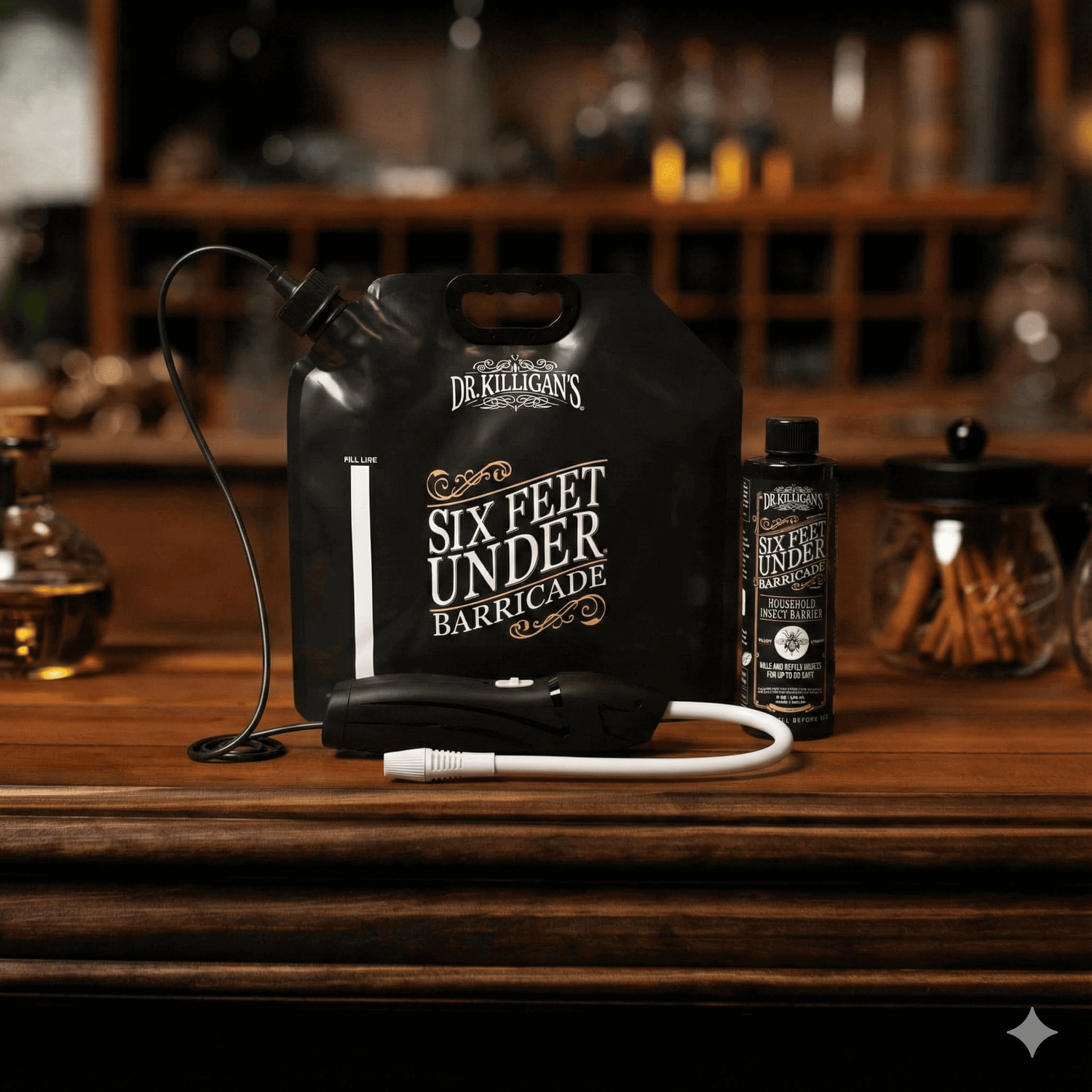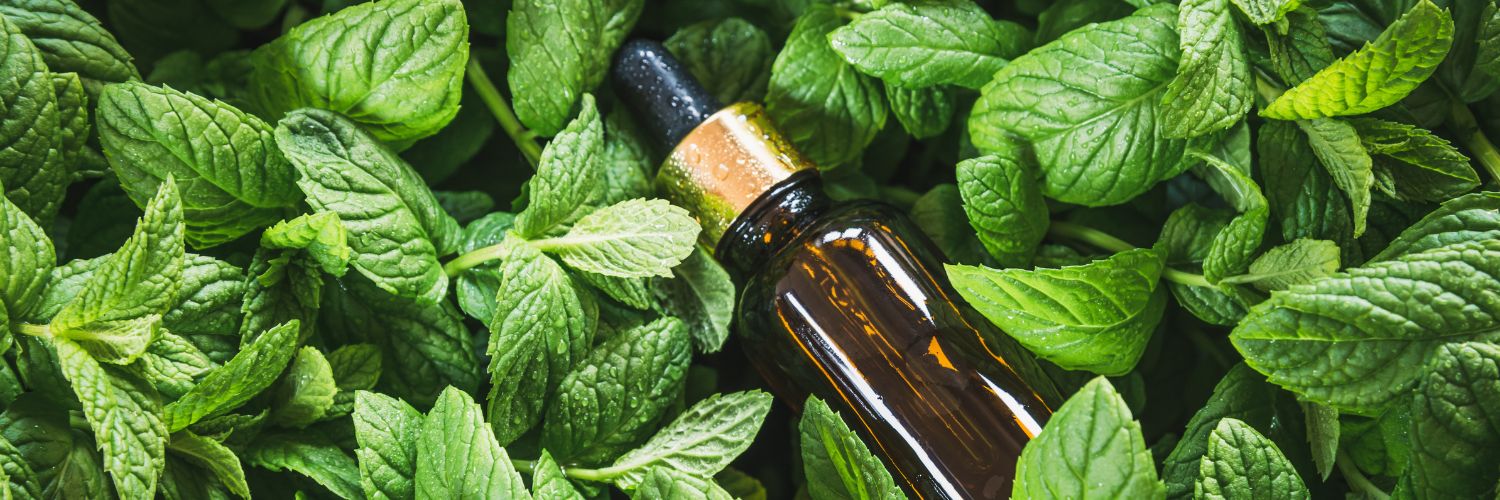Updated on January 4th, 2025
You wore your cutest leather sandals and beige capris to the office picnic, feeling fabulous. Ten minutes into the meal, your legs begin to itch. Slowly wiping your hands on a napkin, you investigate and find red, itchy bumps traveling up your ankles.
Just that morning, you’d been reading about what essential oils are good for bug bites. You wish that you’d quickly grabbed one of those oils on your way out.
What are essential oils?

Essential oils are highly concentrated non-water soluble compounds that are distilled from various parts of a plant—leaves, roots, flowers and other parts.
These parts are manufactured, either through water or steam distillation or cold pressing, to extract the essence of the scent or flavor of the plant. Steam distillation is the most common process, but heavier materials, such as citrus peels, are cold-pressed.
Note: As essential oils are extremely potent, more is not always better. Use as little as needed, not as much as possible. A few drops will go a long way.
How do essential oils work topically?
Essential oils contain tiny molecules. These tiny molecules, when applied to the skin, are quickly absorbed into the bloodstream, traveling around the body, including its systems and organs.
Because the body absorbs the oil's benefits so quickly, it is important to follow safe usage guidelines and dilute oils used on the skin with a safe carrier oil. This is especially important for use on toddlers and children.
How do I know what essential oils to purchase?
Here are three tips to guide your purchase:
- Choose naturally derived oils: Avoid oils made from chemicals, as they are less pure. Opt for oils extracted directly from plants.
- Prioritize organic sources: Select oils from plants that are grown organically and cultivated in their natural environment and growing region.
- Check for safety information: Ensure the product includes precautions for use and contraindications (e.g., medications, pregnancy, etc.)

For carrier oils—such as coconut, jojoba or avocado—choose options that are:
- 100% pure
- Cold-pressed
- Free of additives and preservatives
What are the best essential oils for bug bites?
This may be a matter of personal preference. It may also depend on your skin’s sensitivity to different oils.
Because there is such a vast variety of oils on the market, I have chosen six for their fantastic and differing benefits.
Tea tree oil: For mosquito bites & toddlers

Tea tree oil stands as a robust remedy for insect bites, offering antibacterial, anti-pain, anti-swelling and anti-itching properties. This versatile essential oil soothes irritation and promotes a rapid and healthy healing process. It makes for an essential addition to your bug bite care routine.
It can also be used as an itchy skin treatment for dogs and may even surpass DEET in its mosquito-repelling abilities.
Description: Tea tree oil, with its woody, medicinal aroma, is one of the world’s best-known essential oils. Native to Australia, it has remarkable effects on irritated skin by easing redness, swelling and itchiness while restoring smoothness. As a powerful antimicrobial agent, it prevents bacteria and other microbes from growing, reducing the risk of infection—especially beneficial for children who can’t resist scratching their bites.
Application: Tea tree oil can be used in various ways to address insect bites and irritation.
For a salve: Combine 9 drops of tea tree oil with 9 drops of lavender oil and 2 tablespoons of your favorite carrier oil. Apply directly to the area of concern for relief.
For general use: Dilute tea tree oil to 2-5% in a carrier oil for immediate soothing effects. When using on children, ensure the concentration is on the lower end and always perform a patch test to check for sensitivity or allergic reactions before full application.
Bug bites: Aids with mosquito bites.
Repels: Ants, bed bugs, bees, dust mites, flies, lice, mosquitoes, spiders and ticks.
Lavender oil: For bee stings & ant bites
Lavender oil is prized for its gentle, versatile nature—safe for your baby and toddler. Renowned for its insect-repelling properties and ability to soothe bug bites, it’s a natural solution for the whole family.

Description: Lavender oil has a sweet, dry, herbal smell and holds many beneficial properties. It helps to reduce the itchiness from bug bites, soothe the skin and is pain-relieving. It also calms mood, alleviates stress and reduces anxiety and depression.
Application: Dilute to 2-5% with a carrier oil of your choice and apply to skin.
Bug bites: Aids with mosquito bites, spider bites, fire ant bites and bee stings.
Repels: Fleas, flies, pantry moths, clothing moths and mosquitoes.
Citronella oil: For outdoor protection & mosquito bites
Citronella is renowned for its vibrant, citrusy aroma and its powerful ability to repel insects, particularly mosquitoes. Whether you're enjoying an evening on the patio or venturing into the wilderness, citronella ensures your time outdoors remains uninterrupted by pests.

Description: Citronella oil, with its fresh, lemony scent, is derived from the leaves and stems of certain species of lemongrass. Its uplifting aroma masks scents that attract insects, effectively disorienting and repelling them. Additionally, citronella helps soothe skin irritated by bug bites.
Application: Create a citronella bug spray by combining 10 drops of citronella oil with 2 tablespoons of witch hazel or rubbing alcohol and 2 tablespoons of water. Shake well and spray on exposed skin and clothing. Always dilute before applying to skin.
Bug bites: Relieves irritation and itching caused by mosquito bites.
Repels: Mosquitoes, flies, fleas and other flying pests.
Peppermint oil: For mosquito, spider & ant bites
Peppermint oil is celebrated for its natural cooling properties and its effectiveness in repelling a variety of pests. Its invigorating scent, derived from menthol, offers a refreshing and revitalizing experience while providing relief from bug bites and deterring insects from entering your space.
Description: Peppermint oil, with its grassy-minty, fresh scent, originates in India and is celebrated for its anti-inflammatory and soothing effects. When applied to the skin, it neutralizes hot, irritated sensations, reducing swelling and pain. Its potent aroma acts as a deterrent to many insects.
Application: Peppermint oil offers versatile solutions for repelling pests and soothing bug bites.
For preventative use: Combine 1 part peppermint oil with 4 parts rubbing alcohol, witch hazel or white vinegar in a spray bottle. Shake well and spray on exposed skin or areas prone to pests.
For bug-bite relief: Dilute peppermint oil to a maximum of 5% in a carrier oil and apply directly to the bite for soothing irritation. Avoid using on young children under 30 months and near the face of children to prevent inhalation of menthol.
Repels: Ants, aphids, beetles, caterpillars, fleas, flies, lice, mice, moths, cockroaches, spiders and other pests.

Soothing peppermint roller recipe
Ingredients:
- 2 teaspoons fractionated coconut oil
- 10 drops lavender essential oil
- 10 drops peppermint essential oil
Instructions:
- Combine the ingredients in a 10 ml roller bottle.
- Shake to combine.
- Apply gently to bug bites for soothing relief.
Bug bites: Aids with mosquito bites, spider bites and ant bites.
Chamomile oil: For soothing relief

Chamomile oil stands out for its soothing emollient effects, making it a key ingredient in many skin products and lotions. It also helps to speed up healing and recovery and is comparable to 1 percent hydrocortisone cream for skin irritation.
Description: Chamomile oil, with its strong, warm, slightly fruity, herbal smell is a powerful essential oil with anti-inflammatory properties, thus assisting with mild allergic reactions and the pain, itching, redness and burning associated with insect bites and stings.
Application: Dilute to 1-3% with a carrier oil of your choice and apply to skin.
Bug bites: Aids with most insects that bite or sting.
Repels: Flies, mosquitoes and ticks.
Clove bud oil: For bee stings & ant bites
Clove oil is distinguished for its effectiveness for easing toothaches. This is due to its powerful molecule—eugenol—which is a natural anesthetic. It’s a brilliant essential oil to have around if you’re experiencing the pain of a sore tooth. It is also an effective bug repellent against mosquitoes.
Description: Clove bud oil, with its warm, spicy, clove scent, is created from the dried flower buds of the clove plant. It is a natural anesthetic and antiseptic, highly valuable to have around for a mosquito itch or bug bite.
Application: Dilute to a maximum of .5% with a carrier oil of your choice and apply to skin.
Bug bites: Aids with bee and wasp stings and ant bites. Note: Do not use on broken skin, as it may aggravate or burn it.
Repels: Mosquitoes, spiders, ants and bees

Did you know? One of the main ingredients of Dr. Killigan’s Six Feet Under Plant-Powered Insect Spray—an all-natural insect killer spray—is clove oil. The eugenol content in clove oil can be used to effectively control grain pests, mosquitoes and roaches.
The other main ingredients in Dr. Killigan's Six Feet Under are soybean oil, sodium lauryl sulfate and cinnamon oil. Each of these ingredients has a very specific purpose that aids in killing your unwanted house guests on-contact. Soybean oil suffocates small soft-bodied insects. Sodium lauryl sulfate, which is plant-derived from coconut trees (we never use the petroleum version), allows the essential oils to mix and remain stable with water. Cinnamon oil repels bed bugs, carpenter ants, cockroaches, earwigs, fruit flies, mosquitoes, silverfish, spiders and wasps, to name a few, and is toxic to beetles and ticks.
Blending essential oils for protection
By combining powerful essential oils, we create a protective blend that shields against insects and ensures serene, inspiring outdoor adventures.
Below is a natural bug repellent recipe inspired by the vibrant properties of these essential oils. This blend combines their unique benefits to provide robust protection against pests and sooth the skin:

Natural bug repellent spray
Ingredients:
- 30 drops geranium essential oil
- 30 drops citronella essential oil
- 20 drops lemon eucalyptus essential oil
- 20 drops lavender essential oil
- 10 drops rosemary essential oil
- 1 tablespoon vodka (or rubbing alcohol)
- ½ cup witch hazel
- ½ cup water (or vinegar)
Instructions:
- In a glass spray bottle, combine the essential oils, vodka (or rubbing alcohol) and witch hazel. Mix thoroughly.
- Add water, then swirl to blend.
- Spray onto exposed skin or clothing, avoiding contact with eyes or broken skin.
- Before each use, give the bottle a quick shake to ensure an even blend.
For better consistency, add 1 teaspoon of vegetable glycerin to the mix.
How to use: Keep a bottle by the back door and another in your first aid kit for outdoor adventures. Pairing this spray with a homemade anti-itch cream creates a complete strategy for dealing with insects, from repelling them to soothing their bites.
Safety note: Always perform patch tests before use to check for allergic reactions, especially if you have sensitive skin. Consult a healthcare professional for advice on essential oil use during pregnancy or while nursing.
Final word on essential oils for bug bites
This guide is just the beginning. We'd love to know your favorite essential oils for bug bites and repellents. And don’t forget to try Six Feet Under, our non-toxic, kill-on-contact spray featuring clove and cinnamon oils—safe for you, your family and pets.

















